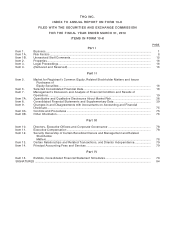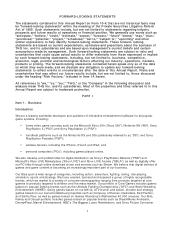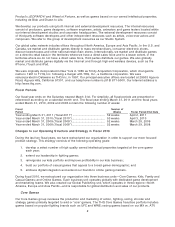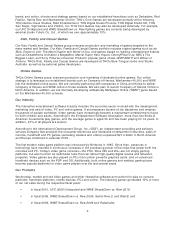THQ 2010 Annual Report Download - page 18
Download and view the complete annual report
Please find page 18 of the 2010 THQ annual report below. You can navigate through the pages in the report by either clicking on the pages listed below, or by using the keyword search tool below to find specific information within the annual report.10
prevent an ownership change from occurring, or that entering into the Section 382 Rights Plan will, in fact,
protect the value of the NOLs.
We believe our financial condition is suf fi cient to meet our operating requirements for at least the
next twelve months. However, in the event our net sales di ffer significantly from our
expectations, we may need to defer and/or curtail currently-planned expenditures, and/or pursue
additional funding to meet our cash needs.
In fiscal 2010, we generated positive operating cash flow and raised $100.0 million through the issuance of
convertible senior notes, bringing our cash, cash equivalents and short-term investments to $271.3 million as
of March 31, 2010, from $140.7 million as of March 31, 2009. However, we operate in a capital intensive
business and intend to invest in product development and licenses in fiscal 2011 and thus do not expect to
generate positive cash flow from operations in fiscal 2011. Although we believe that our financial condition is
sufficient to meet our operating requirements for at least the next twelve months, in the event our net sales
and/or required expenditures differ significantly from our expectations, we may need to defer and/or curtail
currently-planned expenditures, and/or pursue additional funding to meet our cash needs.
Since a significant portion of our net sales are based upon licensed properties, failure to renew
such licenses, or renewals of such licenses on less advantageous terms, could cause our net
sales and/or our profi tabilit y to decline.
Games we develop based upon licensed brands make up a substantial portion of our sales each year. Sales
of our games based upon our two top-selling licensed brands, UFC and WWE, comprised approximately 35%
of our net sales in fiscal 2010. In fiscal 2009, sales of our games based upon our three top-selling licensed
brands, Disney•Pixar, Nickelodeon, and WWE, comprised 47% of our net sales. A limited number of licensed
brands may continue to produce a disproportionately large amount of our sales. Due to the importance to us
of a limited number of brands and the intense competition from other video game publishers to publish
games based upon these licensed brands, we may not be able to renew our current licenses or may have to
renew a brand license on less advantageous terms, which could significantly lower our net sales and/or our
profitability. On January 1, 2010, we entered into an eight year license with WWE. Our license with UFC
expires on December 31, 2011; however, we have the right to extend the term of the license to
December 31, 2015 if we pay a certain amount of royalties to the licensor based upon units sold, which we
believe will be achieved in fiscal 2011. There can be no assurance that we will be able to extend such
licenses and if we are not able to extend them, our net sales may decline significantly.
A decrease in the popularit y of our licensed brands could materially impact our net sales and
financial position.
As previously mentioned, a significant portion of our net sales are derived from products based on popular
licensed properties. A decrease in the popularity of the underlying property of our licenses could negatively
impact our ability to sell games based on such licenses and could lead to lower net sales, profitability, and/or
an impairment of our licenses.
Our inability to acquire or create new intellectual propert y that has a high level of consumer
recognition or ac ceptance could negatively impact our net sales and profi tability.
We generate a portion of our net sales from wholly-owned intellectual property. The success of our internal
brands depends upon our ability to create original ideas that appeal to the core gamer. Titles based on
wholly-owned intellectual property can be expensive to develop and market since they do not have a built-in
consumer base or licensor support. Our inability to create new products that find consumer acceptance could
negatively impact our net sales and profitability.
Increasing development costs for games which may not perform as anticipated and failure o f
plat forms to achieve significant market penetration could decrease our profi tability and result i n
potential impairments of capitalized so ft ware development cos ts .
Over the last few years, video games have become increasingly expensive to develop. Because the current
generation console platforms and PCs have greater complexity and capabilities than the earlier platforms and
PCs, costs to develop games for the current generation platforms and PCs are higher. In the last two fiscal
years, these greater costs have led to lower operating margins, negatively impacting our profitability. If these
























